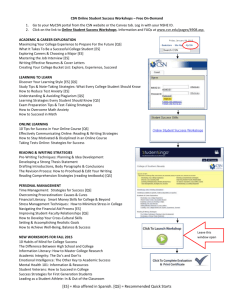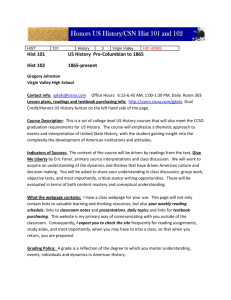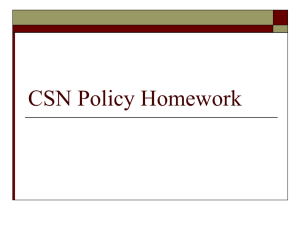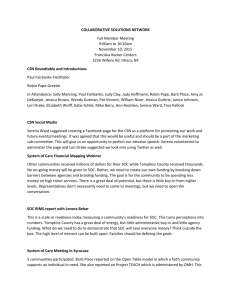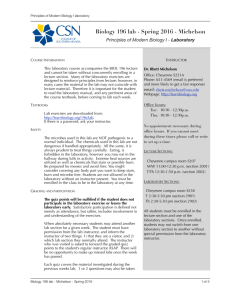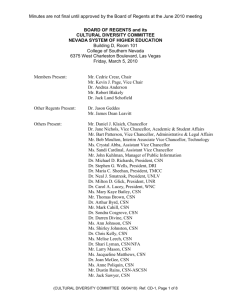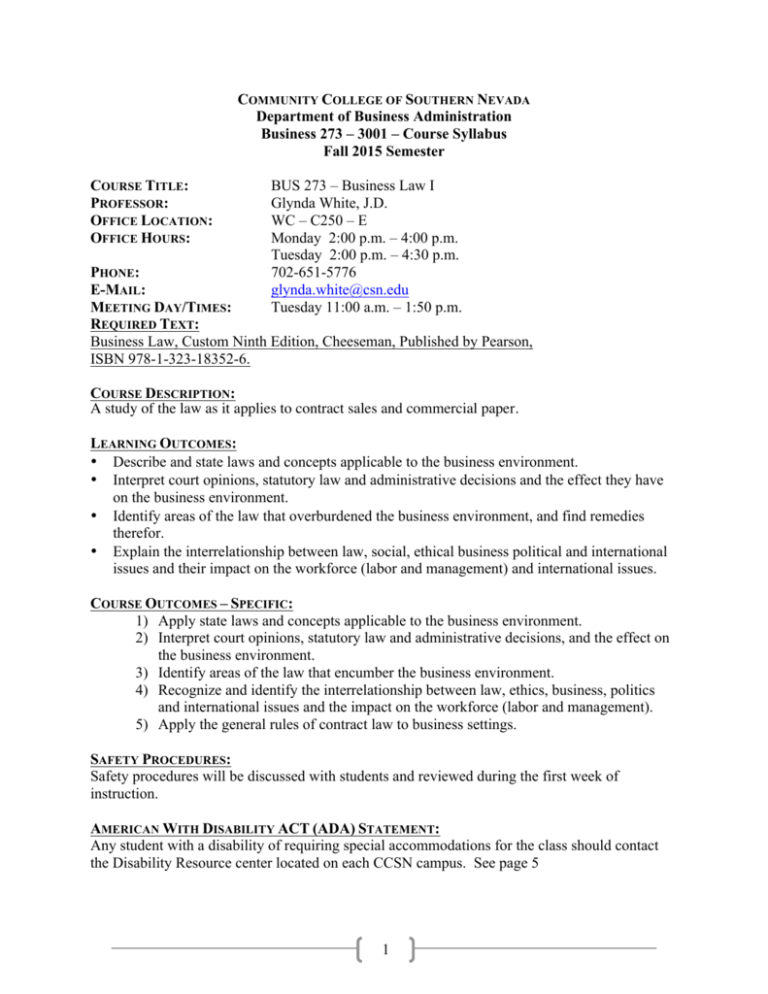
COMMUNITY COLLEGE OF SOUTHERN NEVADA
Department of Business Administration
Business 273 – 3001 – Course Syllabus
Fall 2015 Semester
COURSE TITLE:
PROFESSOR:
OFFICE LOCATION:
OFFICE HOURS:
BUS 273 – Business Law I
Glynda White, J.D.
WC – C250 – E
Monday 2:00 p.m. – 4:00 p.m.
Tuesday 2:00 p.m. – 4:30 p.m.
702-651-5776
glynda.white@csn.edu
Tuesday 11:00 a.m. – 1:50 p.m.
PHONE:
E-MAIL:
MEETING DAY/TIMES:
REQUIRED TEXT:
Business Law, Custom Ninth Edition, Cheeseman, Published by Pearson,
ISBN 978-1-323-18352-6.
COURSE DESCRIPTION:
A study of the law as it applies to contract sales and commercial paper.
LEARNING OUTCOMES:
• Describe and state laws and concepts applicable to the business environment.
• Interpret court opinions, statutory law and administrative decisions and the effect they have
on the business environment.
• Identify areas of the law that overburdened the business environment, and find remedies
therefor.
• Explain the interrelationship between law, social, ethical business political and international
issues and their impact on the workforce (labor and management) and international issues.
COURSE OUTCOMES – SPECIFIC:
1) Apply state laws and concepts applicable to the business environment.
2) Interpret court opinions, statutory law and administrative decisions, and the effect on
the business environment.
3) Identify areas of the law that encumber the business environment.
4) Recognize and identify the interrelationship between law, ethics, business, politics
and international issues and the impact on the workforce (labor and management).
5) Apply the general rules of contract law to business settings.
SAFETY PROCEDURES:
Safety procedures will be discussed with students and reviewed during the first week of
instruction.
AMERICAN WITH DISABILITY ACT (ADA) STATEMENT:
Any student with a disability of requiring special accommodations for the class should contact
the Disability Resource center located on each CCSN campus. See page 5
1
SYNOPSIS OF COURSE CONTENT:
BUS 273 (Business Law I), focuses on legal concepts, fundamental principles of law and case
analysis. This course will cover traditional business law topics and address the legal environment
in which business must operate. Moreover, the course incorporates contemporary issues; namely,
ethical, economic, political, international and social issues.
BUS 273 will introduce to students the judicial structure and procedure for legal proceedings.
Lastly, BUS 273 will introduce students to actual cases, legal issues and court opinions and
rulings. This course will provide students with an understanding of the nexus between law and
the business and how it is applicable and upheld.
CULTURAL COMPETENCY:
This course strives to introduce to students law, legal concepts and legal analysis from a diverse
perspective. We recognize and respect diverse ideas and differences. Lectures and class
discussions are presented by introducing cultural competency and diversity as it has historically
been a part of law and society.
COURSE REQUIREMENTS:
Course assignments will be chosen from the textbook and other course material.
Video tapes will be shown to students during class for class discussions and student
participation. Tapes of court cases will be played for students to analyze and discuss timely
issues and the law.
Handout Material: Court cases, articles and other readings will be given to students or placed in
the library for students to read and prepare for class discussions, debates and assignments or
presentations.
Subsequently, the class will analyze and discuss these cases and their importance to business,
law and society.
This course will cover sixteen (16) Chapters during the semester. Class Participation is required
of all students. Chapter coverage of class material requires students to read and be responsible
for coverage of one chapter per week unless advised otherwise by the professor.
ATTENDANCE POLICY:
Each student will be expected to be in class for all regularly scheduled meetings. Students are
responsible for all course work whether in class or absent. Late assignments are not accepted. A
student’s schedule is considered a contract and constitutes a series of obligated appointments. A
contract demands full performance on the contract by all parties. Attendance in this class is
critical. Students will be allowed three (3) excused absences. The fourth (4th) absence will lead
to the lowering of your grade. Your grade will be lowered by one letter grade. Example an A
grade will be lowered to the letter grade of a B.
2
EVALUATION:
Each student’s grade will be based upon completion of the following:
A. Quiz (1st – 3rd Week)
B. Mid – Term
C. Court/JudicialObservation
D. Class Participation & Article
E. Final Exam
Total
Grading Scale
A = 90 – 100
B = 80 – 89
C = 70 – 79
D = 60 – 69
F = 59 – below
10%
25%
25%
15%
25%
100%
NOTE: This professor does not use the Plus (+) and Minus (-) in the grading scale.
CASE PRESENTATIONS:
As part of class participation, which is mandated, all students will be assigned case(s) from
texts and other material to be briefed and presented in class during lecture and class
discussion. Students must be present and prepared on due date for their case brief
presentation. This assignment is a major part of class participation for the course. Failure
to participate in this required class assignment will have a negative impact on a students’
grades.
EXAMINATIONS:
One mid-term examination and a final examination will be given during the semester. Students
are expected to be timely for exams. Any student who is more that ten minutes late for an exam
(midterm/final) will not be permitted to take the exam absent, exigent or emergency
circumstances.
Description of Exams: Mid-term and final examinations are primarily short essay and
discussion, case analysis, case briefing, legal concepts and rules of law.
MID-TERM EXAM DATE:
OCTOBER 13, 2015
COURT/JUDICIAL OBSERVATION DUE DATE:
NOVEMBER 24, 2015
FINAL EXAM DATE:
DECEMBER 8, 2015
MAKEUP EXAMS:
All test/assignments are accomplished or due on the date assigned. NO, repeat, NO, under any
circumstances will assignments be made up or accepted late after the date of the class period that
the test or assignment was due to be accomplished or assigned. Late accomplishment of tests
(Mid-Term/Final), or receipt of assignment material because of absence or neglect, cannot be
accepted without PRIOR understanding or arrangement with the professor.
3
LIBRARY ASSIGNMENT:
Optional at professor’s discretion. Selected library reading material will be assigned to students
to review for class lectures. Students will be asked to critique such material for discussion.
SUPPLIES NEEDED:
Pen and/or pencil, notebook or pad, blue/green exam booklets, and of course the textbook.
COURSE OBJECTIVES:
1. To help students learn and develop a general working knowledge of legal concepts.
2. To learn basic laws and legal principles that are applicable to business, government and
society.
3. To develop an understanding and appreciation of the law and its functions.
4. To help students understand the legal environment and its importance as they enter the
business world.
5. To help students develop creative and critical thinking and analysis skills.
6. To introduce to students the law through diversity.
7. To introduce and expose students to the concept of cultural competency.
REQUIRED READING/LIBRARY:
A. Law Article/Commerce Clause – Chapter 4 (Is Broccoli Commerce?)
B. Martha Stewart, Macy’s, and JCP Contract/Article (Internet Use/In class) contract
chapters
C. Michael Moore (Chapters to be assigned.)
EXTRA CREDIT:
Extra Credit work may be assigned at the discretion of the professor where the assignment is
relevant to coursework and educationally motivating. This is not part of the required coursework
or the grade evaluation process. Extra credit is not assigned to students individually.
GUEST LECTURES/SPEAKERS:
The professor will bring in guest lecturers to enhance the course when time permits.
CHAPTERS TO BE COVERED:
A. Chapters 1 – 2; Introduction to Law and Ethics
B. Chapters 4 – 8; Torts/Intellectual Property/Criminal Law/Product and Strict Liability
C. Chapters 9 – 15; Contracts
D. Chapter 42 – Ethics
E. Chapter 54 – International and World Trade
TEACHING AND LEARNING THROUGH FILM:
Class lectures, discussions, and course work for the semester will be presented to students
through film. Films will be shown to present issues of : conflict, ideas and critical analysis to
enhance students learning comprehension; and further expose students to real, factual situations
that are prevalent in business society and the law. Teaching through film has been incorporated
throughout the business law course. This should be an integral part of the learning process for
4
students. At various intervals during the semester, as we cover topics and specific areas of the
law, we will show films to illustrate pertinent points and concepts.
ARTICLE RESEARCH:
On a day designated by the professor, students will select/research an article relevant to any of
the topics and discuss it in class. Topics include: Law, Business, Economics, Ethics,
World/Foreign Affairs, Domestic Affairs, Social Consciousness, Politics, War, Social Justice and
Equity, Technology and Health Care.
MEDIA:
The presentation of films and playing cassettes of landmark Supreme Court cases are an integral
part of this writer’s teaching techniques. Films provide a foundation for good student dialogue
and debate. Therefore, note taking on films, tapes (cassettes) or videos is required of all students.
The course material is always subject to examination.
ACADEMIC INTEGRITY:
Scholastic dishonesty will not be tolerated and will be prosecuted to the fullest extent. You are
expected to have read and understood the current issue of the student handbook (published by
Student Services) regarding student responsibilities and rights, and the intellectual property
policy, for information about procedures and about what constitutes acceptable on-campus
behavior. http://www.csn.edu/academicintegrity
ADA STATEMENT:
Students with medical, psychological, learning or other disabilities desiring academic
adjustments, accommodations or auxiliary aids will need to contact a Campus Disability
Resource Center – Cheyenne: 651-4045, Charleston: 651-5089, Henderson: 651-3086. DRC
determines eligibility for and authorizes the provision of services.
http://www.csn.edu/pages/2566.asp
TUTORIAL SERVICES:
CSN students can receive free; unlimited tutoring for the classes they are enrolled in providing a
tutor is available. For an appointment call Cheyenne 702-651-4232, West Charleston 702-6515732, Henderson 702-651-3125. Or book an appointment online at
https://csnts.mywconline.com/
TARDINESS:
It is the professor’s position that students should be timely for class sessions. Therefore, students
are strongly encouraged to be on time for class. Continuous, systematic tardiness by any student
will result in a consultation with the professor to evaluate your commitment to the course.
Excessive tardiness will have a negative impact on a student’s grade.
RECORDING IN CLASS:
All recording in class is for personal use of the individual student only. Any replaying or
copying of this for other purposes is hereby prohibited. All right are reserved by the Professor
and shall not be taken out of the context of the College Course at hand. This is a privilege not a
right and is therefore revocable at any time should it be misused or abused in any fashion.
5
Recording is with requested permission of the Professor only and with prior agreement the above
statement. Video of class lectures is not permitted.
USE OF CELL PHONES AND TEXT MESSAGING:
All Cell Phone and Text Messaging shall be restricted to before and after class. All phones
should be set on silent/vibrate. The Professor reserves the right to restrict all use of cell phones
in class. Students will be required to leave class should this become a problem. Cell phone use
and texting during class are prohibited.
Supplemental or additional information or material is subject to become an addendum to this
syllabus if deemed necessary or if relevant at the discretion of the professor.
EXITING CLASSROOM REVOLVING DOOR:
The classroom is not a revolving door. Continuous exiting and re-entering the classroom is not
tolerated. Students who exit and re-enter the classroom excessively will be asked to leave class
and schedule a conference with this professor.
COURSE WITHDRAWAL:
This professor does not give “W” for a class grade. Students must officially withdraw from the
class at Admissions and Records.
COURSE REQUIREMENT/COLLEGE LEVEL AND QUALITY COURSEWORK:
Course assignments submitted below college level standards; in improper formats, incorrect
grammar and sentence structure and misspelled words will not be acceptable for grading by this
professor. Quality is defined as: A level of or degree of excellence. Written assignments must
demonstrate critical thought and analysis when responding to questions and discussion. Students
must give substantial effort to course assignments. And assignments appearances must reflect a
level of high quality.
IMPORTANT CLASS NOTES:
*PLEASE TURN OFF ALL BEEPERS AND CELLULAR PHONES PRIOR TO ENTERING CLASS.
Research days will be assigned by the professor for outside coursework when deemed necessary.
Additional reading material may/shall be assigned at the professor’s discretion.
*NO FOOD PERMITTED IN THE CLASSROOM.
*DISRESPECT, RUDENESS, AND DISCOURTESY ARE NOT TOLERATED IN THIS CLASS.
*SLEEPING IN CLASS IS NOT TOLERATED.
Students are expected to be prepared for class each class meeting.
Office hours will be posted outside of the professor’s office door.
6
Failure to take final exam without PRIOR discussion with professor is an automatic failure of
course.
Students who discontinue (stop) coming to class before the end of the semester and do not
officially withdraw from this course will receive a grade of F.
Students are to use green exam booklets for taking exams.
Students will not leave the classroom while taking an exam without permission from the
professor.
Students will not be permitted to take an exam if they arrive for class ten minutes or more
after the exam has commenced.
DISRUPTIVE AND ABUSIVE BEHAVIOR:
Students are expected to conduct themselves in a professional manner in the classroom, on
campus and through electronic media at all times. Disruptive and abusive conduct will not be
tolerated. Students who fail to adhere to behavioral standards may be subject to discipline per
CSN’s Disruptive and Abusive Student policy. A copy of the complete Student Conduct Code
and Disruptive and Abusive Student Policy is available for review on the CSN web page.
CSN Website and College Catalog:
These sources contain essential information about attendance, unregistered students in class,
religious holidays, safety/security issues, emergency notification, testing, adding and dropping
classes, course repeat, auditing, credit hour load, incomplete grade, grade appeals, auxiliary
services, Counseling and Psychological Services (CAPS), tutorial, retention/E-alert, student code
of conduct, student rights and responsibilities disruptive and abusive students, participation in
extracurricular activities, and accepted email use.
College Library Services:
CSN College Library Services offers ongoing research workshops throughout the semester.
Bring your topic or assignment to one of the workshops on the basics of locating and citing
quality information and receive in-depth assistance with a librarian. Check out the schedule at
http://sites.csn.edu/library/libraryworkshops.html or call 651-5729 for more information.
CSN POLICIES AND SERVICES:
Students’ Rights and Responsibilities pertaining to CSN policies and services are found at:
http://www.csn.edu/pages/600.asp
INSTRUCTIONS RE LATE PROFESSOR:
Students must wait for fifteen (15) minutes if professor is late. Students are required by policy to
wait fifteen (15) minutes after the scheduled class time for the professor. The professor is given
this grace period for the class before it is officially determined that the professor is late and class
is cancelled.
7
FINAL REMARKS:
Any information contained in this syllabus may be subject to change with advance notice,
as deemed appropriate by the professor.
BUS 273-3001
Course/Class Schedule
Fall 2015
Assignment Date Syllabus Review August 24, 2015 Chapter 1 & 2 September 1, 2015 Chapter 4 September 8, 2015 Chapter 5 September 15, 2015 Chapter 6 September 22, 2015 Chapter 7 September 29, 2015 Chapter 8 October 6, 2015 Mid-­‐Term Exam October 13, 2015 Chapter 9 October 20, 2015 Chapter 10 October 27, 2015 Chapter 11 November 3, 2015 Chapter 12 November 10, 2015 Chapter 13 & 14 November 17, 2015 Chapter 42 November 24, 2015 Court/Judicial Observation November 24, 2015 Review/Study Day December 1, 2015 Final Exam December 8, 2015 8

